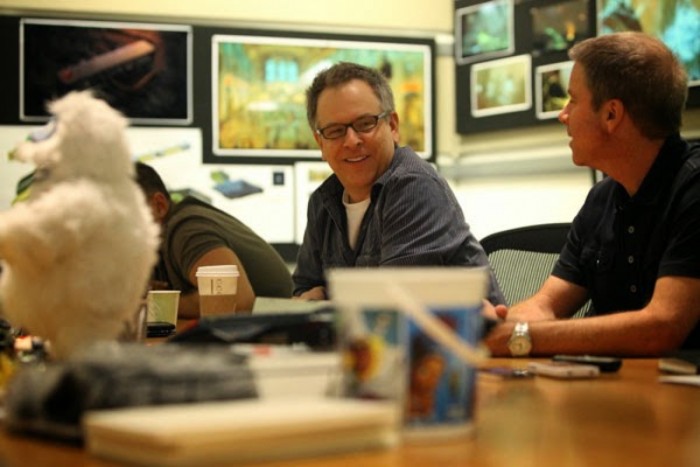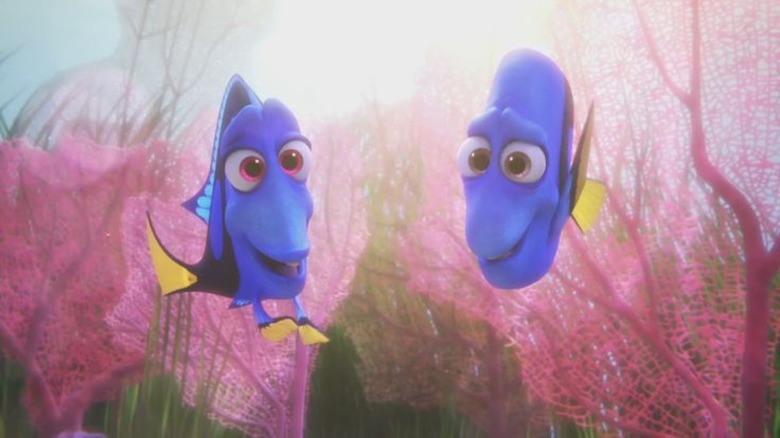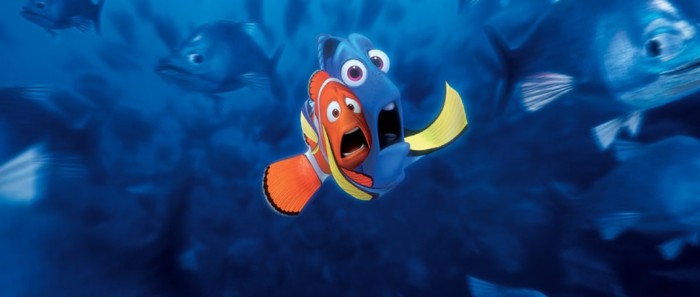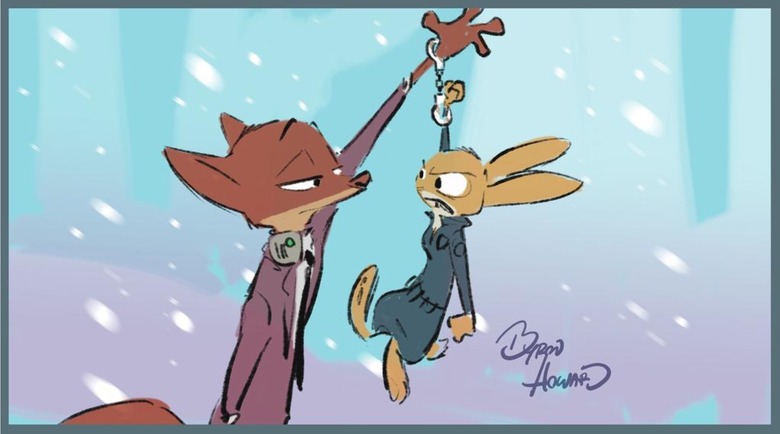How 'Zootopia' Director Rich Moore Helped To Find Dory
At the conclusion of Finding Dory, I was surprised to see Wreck-It Ralph/Zootopia director Rich Moore's name listed in the special thanks section of the film's credits. I decided to ask Finding Dory director Andrew Stanton about it and the fascinating story that followed gives us some insight into how the Disney/Pixar creative ecosystem works, and how the creative heads of each company help push each other to create better stories. What's the story behind that Rich Moore Finding Dory credit? Find out, after the jump.
The Set-Up
Before we get to that story, let's set up this relationship. It's not just one of business. Andrew Stanton went to school with Rich Moore and Jim Reardon, as he explained:
Rich and Jim and I are classmates. We go way back. We were very close all through school and stayed very close all through our professional lives. I was trying to always woo Jim and Rich to come up and work at Pixar and they were always kinda wooing me to come to Simpsons. We've know each other forever. We're very close friends. I finally convinced Jim to come onboard to help me write WALL-E. So he worked at Pixar for a couple of years. And then Rich we finally got into Disney because he wanted to stay living south. And now the rest of the world has discovered how great of a filmmaker he always was. He was always the star of our class. And Jim was always the smartest guy in our class.
You probably know Rich Moore now as the director of Wreck It Ralph and co-director of Zootopia alongside Byron Howard. But you might not be as familiar with Jim Reardon, who worked on The Simpsons for 295 episodes of the first two decades of that animated series. Stanton brought him on to WALL-E as a story supervisor and writer, before he worked on Wreck-It Ralph and Zootopia. Reardon is actually the guy responsible for Zootopia's funniest scene — you know, the one involving the sloths.
How the Disney Story Group Helped to Find Dory
But why are Moore and Reardon thanked in the credits for Finding Dory? Stanton said:
I was just one of the lucky people that got to take advantage of working with them. So they've done, as friends, extra help when we wanted other eyes, because now we not only have the brain trust at Pixar, but we also show the equivalent of their story trust down at [Disney Animation].
Many companies have formed these brain or story trusts, emulating what Pixar has been able to accomplish. Some have found success with this structure, while others have not. Marvel reportedly disbanded their creative committee last year, but that's likely due to the rumored contention between Kevin Feige and Ike Perlmutter. The Lucasfilm Story Group is taking charge of the future of Star Wars. DreamWorks has their own version of this with filmmaker Guillermo del Toro, while Warner Bros. has more recently formed a "creative consortium" for their upcoming animated films, bringing in Phil Lord and Chris Miller, Nicholas Stoller, John Requa and Glenn Ficarra as well as Jared Stern.
Moore joked to me at the Zootopia junket that Disney's story trust is just like Pixar's famous brain trust but "not as brain, not as smart."
You know, we're the story trust. We like stories. We don't got them big brains like up in Emeryville.
But Stanton refused to joke about that, insisting that the story trust is "rising quickly." Stanton explained that for every film, they will screen a rough cut of the movie to Disney's story trust in order to help improve their work.
What we found is the smart thing to do, and I don't know if it's a hard, fast rule, but it just seems to be in the last couple films. We kind of wait till we think the film is working but we have one more shot at changing everything. And that's when we kind of show it to Disney, because everybody has lost all their objectivity at Pixar. So we kind of need, "How can we show this to a group that's just as smart but doesn't know anything? And we've got one more chance at bat to just kind of expose something that was sitting in front of us that we couldn't see."
And Stanton admits that while that meeting is very helpful, no one involved wants to be there.
They don't like that meeting and we don't like that meeting, because you want to be done. You've worked really hard. It's usually about two and a half, three years in. You don't want to know that there's still something wrong. So it's never a fun time. But it's always like, "Thank goodness they saw it."
So how did Rich Moore, Jim Reardon and the Disney Story Group help Pixar to find Dory? Originally, Finding Dory started with a long prologue that took place during Dory's childhood years, and the film just took too long to get started and Dory's story arc was not clear enough to audiences.
Dory's arc was still not clear. Even though we understood it finally as the filmmakers, it wasn't clear to the rest of the audience. And that's what brought forth the flashbacks. The flashbacks were a last-minute idea. ... I had too much prologue in Finding Dory and I was telling too much. So we realized, "we need to make there be a hole in this and let Dory...let us be alone with Dory." As she gets farther, she earns memories and we get to experience that catharticness with her.
It turns out, this is the exact opposite problem of what Andrew Stanton encountered while making Finding Nemo. Read that story and also find out how a note from Andrew Stanton drastically changed Zootopia.
The Exact Opposite Problem of Finding Nemo
Interestingly, this is the exact opposite of the problem that Stanton encountered on Finding Nemo almost 13 years ago.
On Nemo, for three and a half years that entire prologue of him losing his wife and family was actually doled out as flashbacks through the whole movie, and then the real tragedy was exposed at the time of the fishing net. And you never related to Marlin. Everybody always thought he was too whiny and too needy. And then the minute we put it all to the front and didn't change a line of his, everybody sympathized with him. That's what made it so daring to put such a tragedy up front, because it helped the whole movie. So to suddenly discover in an ironic way that we had the opposite problem. It gave me such a sense of piece because it was like the inverse of the other movie. But that only came out of pressure from, it still wasn't working 100% when Disney watched it.
Stanton says the special thanks to Moore and Reardon is deserved because he "had a little bit more interaction with them as far as getting help."
And I helped them a bit on Zootopia, too. So it's a very mutual...
How Andrew Stanton's Note Helped Fix Zootopia
In fact, Stanton may be responsible for one of the biggest changes in Zootopia. As you probably know from our extensive coverage, Jason Bateman's character Nick Wilde was originally the protagonist of the film. The film wasn't working and they decided to swap the lead to Ginnifer Goodwin's character Judy Hopps a year and a half before the film's release, which in animation time is near last-minute. That huge change was the result of a suggestion from Pixar brain trust member and Finding Dory director Andrew Stanton. Zootopia co-director Byron Howard previously told my colleague Bill Desowitz how it went down:
We got a great note from Andrew Stanton. Because you're introducing the film through Nick's cynicism, he doesn't like the city and I as an audience member can't root for the city. I don't like the city and want Nick to escape from it rather than see it healed. And we figured out if the movie's about bias, then that needs to come from from Judy, and let Nick bring that to her attention through their character interaction. It was a massive shift. We really had to tear the movie apart, but it made things so much cleaner. I think that's why we do so many buddy comedies in animation. To watch characters change each other and become more whole as a pair is really rewarding. Judy's eternal optimism becomes a flaw, which she's forced to own up to.
I am obsessed with the development process of great stories and these kind of details. It's interesting to hear how these great movies might have almost been something very different, and how last-minute insights were able to course-correct the films into what we know and love today.




